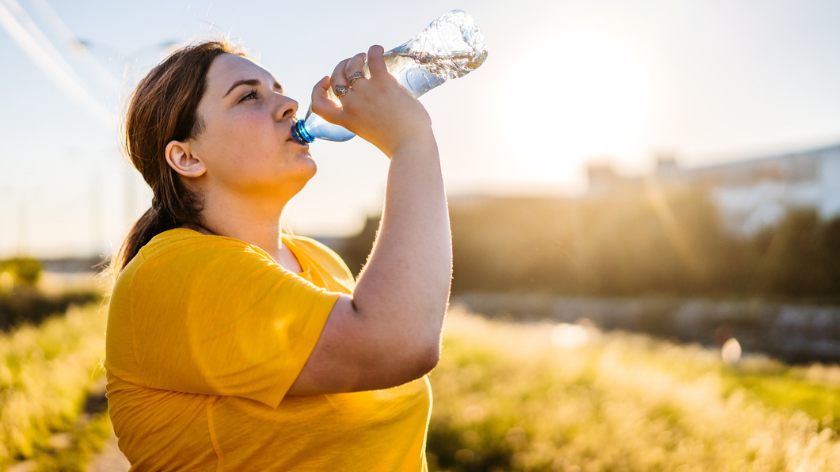While it’s important to be mindful of how much water we’re consuming as we sail into the heart of summer, hydration is critical for optimal health no matter the season.
And it’s a critical topic to discuss.
According to one study, as many as 75% of Americans are chronically dehydrated, and nearly 80% of American workers believe they don’t drink enough water. Here is why water is so important and how can you make sure you get enough of it.
Why is drinking water so important?
It can be argued that water is more important to human survival than food. Scientists believe humans can survive about three weeks without food, but could only last about three to four days without water. It makes sense when you consider an adult’s body is made of 60% water and a child’s body is 75% water!
Moreover, our brain and heart are made of 73% water, our lungs are 83% water, our muscles and kidneys are 79% water, and our skin contains 64% water. Our bodies rely on water to work at an optimal level and carry out key functions including:
- Carrying nutrients and oxygen to our cells
- Carrying waste away from our cells
- Aiding digestion
- Stabilizing our heartbeat
- Cushioning and lubricating our joints
- Regulating body temperature
- Normalizing blood pressure
- Protecting organs and tissue
- Maintaining cognitive functions, including focus, alertness, short-term memory
- Boosting metabolism*
How much water do I need to drink?
While each person has different needs, it is generally agreed upon that healthy men, on average, need to drink about 15.5 cups (125 ounces) of water per day, while healthy women need to drink 11.5 cups (91 ounces) per day. However, all of your water doesn’t need to come from water or other beverages. About 20% of our daily intake of water comes from the food we eat, such as greens, fruits and vegetables.
It’s important to note that you’ll need to drink even more water when you are more physically active, live in or visit a hot climate, are running a fever, or are experiencing diarrhea or vomiting.
How can I tell if I’m dehydrated?
You might be surprised how much water you lose in a given day. You lose water when you sweat, use the bathroom, breathe and even sleep! Here are a few signs that you might be dehydrated:
- This may seem obvious, but if you feel thirsty, you’re already dehydrated.
- Dark colored urine. Dark colored urine is an indication that you are dehydrated, while light colored urine means you’re properly hydrated.
- Feelings of anxiousness or irritability. Dehydration puts stress on your cognitive functioning and may cause you to feel tired, anxious or irritable.
- Taking fewer trips to the bathroom
- Dry mouth and nose
- Headache or light-headedness
- Muscle cramps
Tips for staying hydrated
- Begin your day with water. When you wake up each day, drink 12 to 16 ounces of water. This helps replace the water you lost while sleeping.
- Add flavor. If you’re someone who thinks water tastes boring, try steeping your water with fresh fruit (such as lemon or strawberries), vegetables (cucumber or ginger) or herbs (basil or mint) to make things more exciting. You can find water bottles or pitchers that are designed to make steeping easy.
- Consume water-rich foods. Watermelon, strawberries, lettuce, cucumbers, broths and soups are all great sources of water. Here’s a list of other foods to consider.
- Buy a reusable water bottle and carry it around with you. It will be even more helpful if that bottle displays measurements on the side to help you keep track of how much you’re consuming.
- Dilute sugary drinks with water and ice. If you’re craving lemonade or something sweet, diluting it will make it healthier and increase your water consumption.
- Set goals. Setting goals is a good way to establish any habit and water consumption is no different. Set a goal to drink a certain amount every hour to help you stay hydrated throughout the day. Don’t forget to reward yourself if you meet your goal!
- Set reminders. Set a reminder on your phone to drink water throughout the day. For example, you can set a reminder to take a few sips every 30 minutes or to finish a glass every hour.
- Replace other drinks with water. Sports drinks and soda are high in sugar which can drastically increase your caloric intake.
- Drink one glass of water before each meal. This is an easy way to add three glasses of water to your daily intake and make it a habit. Moreover, your body sometimes mistakes feelings of thirst for hunger, so drinking water can help you figure out if you’re truly hungry.
- Go one-for-one. If you drink coffee or alcohol, try drinking a glass of water for each cup of coffee or alcoholic beverage you consume. (Note: Alcoholic intake should be limited to one drink per day for women, and 1 to 2 drinks for men).
Start Sipping
Drinking an adequate amount of water is one of the most important things you can do to maintain and even improve your health. If you haven’t had enough water today, don’t worry. Grab a glass and start sipping!
*While research is limited, one study found that drinking water could boost healthy men and women’s metabolic rate by 30%.







